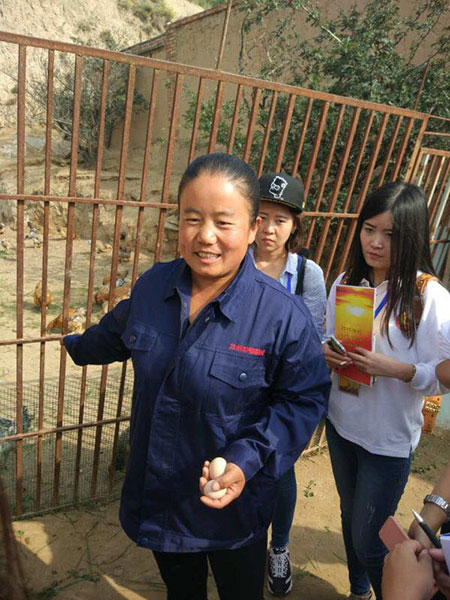
A villager in Shenjialing feeds the chickens she raises. (Photo by Ma Chi/chinadaily.com.cn)
In a place where one of the fiercest battles in China's civil war took place, villagers in Shenjialing are shaking off poverty by taking advantage of beneficial policies.
Gao Junxia looks like an ordinary rural middle-aged woman in Northwest China, but in actuality she is a key person of a poverty alleviation program in Shenjialing village.
Gao's home is located on a mountain just kilometers away from downtown Lanzhou, the capital city of Gansu province. On one hand, the village is known as a place of strategic importance where, in 1949, a fierce battle fought between the Chinese People's Liberation Army and the defending Kuomintang forces took more than 3,000 lives.
On the other hand, Shenjialing has long been known as a village mired in poverty. Back in 2013, among the 409 households of the village, almost one third of the population earned less than 2,800 yuan in net income a year, compared with the national average of more than 10,000 yuan.
Farmers in the mountainous village plant subsistence crops like potatoes and corn as well as lilies, a cash crop, the bulb of which makes a famous local dish.
Since the beginning of this year, an agricultural cooperative was set up in the village to help poverty-stricken residents make more money. Gao Junxia is the head of the chicken raising program.
The cooperative buys chicks and gives them to villagers for free. Raising the chicks takes more than four months and when they grow up, the cooperative helps villagers contact buyers and transport the chickens out of the village.
Gao said the chickens and their eggs were sold at a good market price, thanks to the relatively natural growing method. Such a chicken is priced at 26 yuan per jin (half a kg), almost triple the price of a chicken raised in a cage.
A total of 36 households have taken part in the program since its foundation, and more than 2,000 chickens are being raised now, said Gao. Their average net income has increased by more than 1,000 yuan since joining the program.
Other methods the local government has adopted to fight poverty include teaching villagers skills such as driving, making beef noodles or how to provide maternity service.
It also arranged for some people from poor families to be sanitary workers or work other blue-collar jobs in the city of Lanzhou.
Since last year, to improve the efficiency of poverty alleviation, the local government decided to designate one official to help one poverty-stricken family.
All the efforts have paid off. More than 500 people have been lifted out of poverty since 2013.
Despite the achievement Shenjialing has accomplished, there is still a long way to go for villagers to be well off.
Zhu Yuanbao's family was a poverty-stricken household in the village. Thanks to skills training and a subsidy from the government, the family's financial conditions have improved a lot in recent years.
But in 2010, Zhu used all the family's savings to pay the 60,000 yuan medical bill when his wife had surgery, even though more than half of the surgery fee was covered by insurance the government bought for his wife. Zhu said he felt much pressure from the cost incurred from his wife's disease.
And the same thing has dragged some other villagers back into poverty, said a village staffer surnamed Wang.



















































